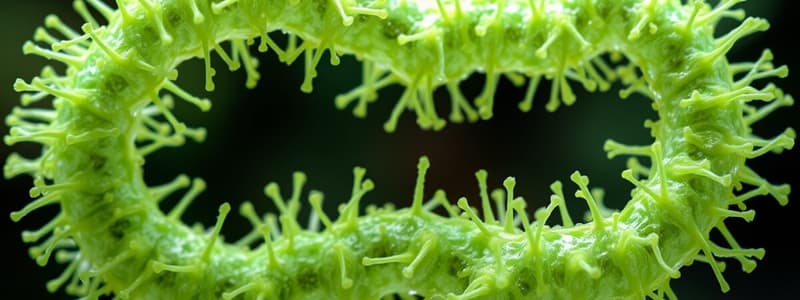Podcast
Questions and Answers
What is the term for one of the two prokaryotic domains?
What is the term for one of the two prokaryotic domains?
- Eukarya
- Animalia
- Protista
- Archaea (correct)
What is the scientific study of life called?
What is the scientific study of life called?
Biology
The term for the entire portion of Earth inhabited by life is the ______.
The term for the entire portion of Earth inhabited by life is the ______.
biosphere
What is defined as the basic structural and functional unit of all organisms?
What is defined as the basic structural and functional unit of all organisms?
A consumer relies upon the feeding of other organisms for survival.
A consumer relies upon the feeding of other organisms for survival.
What is an experiment in which an experimental group is compared with a control group called?
What is an experiment in which an experimental group is compared with a control group called?
Recorded observations are called ______.
Recorded observations are called ______.
What is defined as a type of logic where specific results are predicted from a general premise?
What is defined as a type of logic where specific results are predicted from a general premise?
What is the genetic material of an organism or virus called?
What is the genetic material of an organism or virus called?
Inductive reasoning is based on specific observations to form generalizations.
Inductive reasoning is based on specific observations to form generalizations.
What is the term for the kingdom that consists of multicellular eukaryotes that ingest their food?
What is the term for the kingdom that consists of multicellular eukaryotes that ingest their food?
Which of the following kingdoms includes organisms that absorb nutrients after decomposing organic material?
Which of the following kingdoms includes organisms that absorb nutrients after decomposing organic material?
Two or more atoms held together by covalent bonds is called a ______.
Two or more atoms held together by covalent bonds is called a ______.
What is a specialized center of body function composed of several different types of tissues called?
What is a specialized center of body function composed of several different types of tissues called?
Flashcards are hidden until you start studying
Study Notes
Prokaryotic Domains
- Archaea and bacteria are the two domains of prokaryotic organisms.
Biological Terms
- Bioinformatics uses computational tools to analyze biological data from extensive datasets.
- Biology is defined as the scientific study of life.
- The biosphere encompasses all ecosystems on Earth.
Cellular Structures
- A cell is the fundamental structural and functional unit of all living organisms.
- Eukaryotic cells have membrane-bound nuclei and organelles, unlike prokaryotic cells.
Community and Ecosystem Concepts
- A community consists of various populations of different species living in proximity and interacting.
- Ecosystems include all living organisms in an area and their physical environment.
Organismal Categories
- Consumers depend on other organisms for nutrition and survival.
- Animalia, Fungi, and Plantae are three kingdoms of life, representing multicellular eukaryotes with distinct feeding strategies.
Scientific Methodology
- A controlled experiment compares an experimental group against a control group to isolate the tested variable.
- Data refers to collected observations used for analysis in scientific inquiry.
- Deductive reasoning predicts specific outcomes from general premises, while inductive reasoning generalizes from specific observations.
Genetics and Molecular Biology
- DNA is a double-stranded molecule containing the genetic instructions for the development and function of living organisms.
- A gene is a unit of heredity comprised of a specific sequence of nucleotides in DNA.
- The genome refers to the complete set of genetic material of an organism, including its coding and non-coding sequences.
Hypotheses and Theories
- A hypothesis is a proposed explanation for a phenomenon, narrower than a theory and open to testing.
Task of Inquiry
- Inquiry is the pursuit of information and understanding through focused questioning, essential in scientific exploration.
Feedback Mechanisms
- Negative feedback processes counteract changes in physiological variables to maintain homeostasis.
- Positive feedback amplifies changes in a physiological variable, enhancing certain processes.
Structural Complexities
- An organ is a body structure composed of multiple tissue types working together.
- An organ system is a collection of organs that coordinate specific biological functions within an organism.
Molecular Composition
- Molecules consist of two or more atoms connected by covalent bonds.
Studying That Suits You
Use AI to generate personalized quizzes and flashcards to suit your learning preferences.




